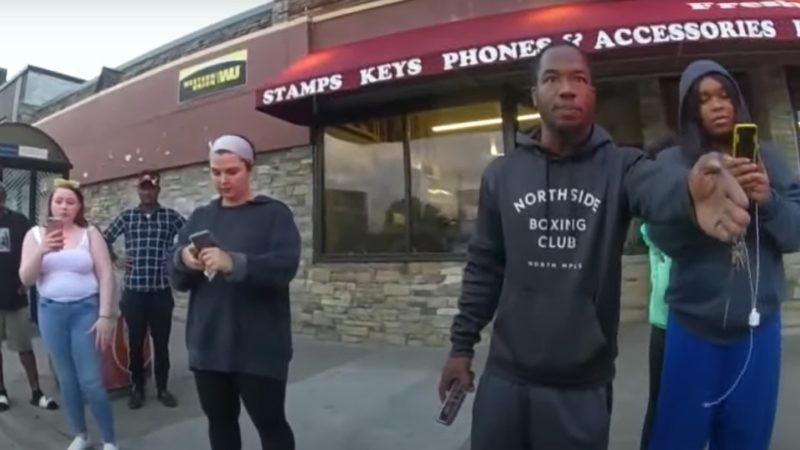Does This Video Show a Cop Aiding and Abetting George Floyd's Murder?
Tau Thao repeatedly dismissed bystanders' concerns as his colleagues used a fatal prone restraint.

The lawyers representing former Minneapolis police officer Tou Thao, who is accused of aiding and abetting the second-degree murder of George Floyd, argue that his role in the May 25 incident, which triggered nationwide protests, was too peripheral to justify that charge. Newly released video from Thao's body camera sheds light on that claim, showing that he stubbornly dismissed the concerns of increasingly alarmed bystanders, repeatedly declined to intervene on Floyd's behalf or check on his welfare, and physically prevented pedestrians from approaching Floyd as he was pinned to the pavement in a prone position.
The 22-minute video begins as Thao, who was hired by the Minneapolis Police Department in 2012, and his partner, Derek Chauvin, hired in 2001, arrive at Cup Foods, the store where Floyd allegedly tried to make a purchase with a counterfeit $20 bill. The arresting officers, Thomas Lane and J. Alexander Kueng, both new to the police department, are trying to force a panicked and resistant Floyd, who says he is claustrophobic and asks to ride in the front seat, into their squad car. "I'm not a bad guy," he says. "Please….I can't breathe."
Floyd tumbles or is pulled out of the car onto the street, saying, "I'm gonna lay on the ground." After some more struggling, that is where he ends up, handcuffed and face down as Chauvin kneels on Floyd's neck. Lane and Kueng help keep him down by applying pressure to his legs and back, respectively. "I can't breathe," Floyd says over and over, crying for his mother. "Please….I'm about to die." During the struggle and Floyd's subsequent restraint, the three officers repeatedly dismiss his complaints that he is having trouble breathing, saying the fact that he is still talking shows he is getting plenty of air.
Thao—who initially seems to make light of the situation, saying "this is why you don't do drugs, kids"—echoes his colleagues' assurance as he confronts six to 10 onlookers, several of whom express concern about Floyd. "He's talking, so he's fine," Thao tells them.
"He ain't fine," replies a bystander who says he trained at the police academy, suggesting that Chauvin's "jiu-jitsu" maneuver is obstructing Floyd's breathing. "That's bullshit, bro. You're fucking stopping his breathing right there, bro."
Thao reiterates that "he's talking," saying, "It's hard to talk if you're not breathing." The bystander says the cops should "get him off the ground" and berates Thao for failing to intervene.
"Is he talking now?" a woman who is recording the encounter on her cellphone asks about five minutes after Chauvin began kneeling on Floyd's neck. "Look at him. Bro, get the fuck off of him." The bystander who was the first to speak up lays into Thao again for doing nothing. "You're a bum for that, bro," he says, asking for Thao's badge number. When the guy steps into the street, Thao tells him to get back on the sidewalk. He gives the same order to other bystanders who step off the sidewalk.
A woman approaches Thao, identifying herself as a Minneapolis firefighter. "You should check on him then," says the man who spoke up earlier. "He's not responsive." Thao orders the firefighter off the street. "Does he have a pulse?" she asks, standing on the sidewalk. "Check for a pulse. Let me see a pulse." The man who asked for Thao's badge number reiterates that suggestion. "The man ain't moved yet," he notes. The two of them become increasingly insistent. "Check his pulse right now and tell me what it is!" says the firefighter.
"I'm busy trying to deal with you guys right now," Thao says. When the son of the store's owners steps into the street, worried about Floyd's condition, Thao pushes him back. Thao responds to the heated criticism of his inaction by saying, "If that makes you feel good about yourself, go ahead."
According to the initial criminal complaint against Chauvin, he kneeled on Floyd's neck for nearly nine minutes, twice rejecting Lane's suggestion that they roll him onto his side. After five minutes, Floyd "stopped moving." A minute later, "the video appears to show Mr. Floyd ceasing to breathe or speak." Even after Kueng checked Floyd's pulse and said he could not find one, Chauvin remained in position, finally removing his knee two minutes later as an ambulance arrived.
It's not clear exactly how much of this Thao directly observed. But he had ample notice that the force used by his colleagues could prove deadly. Instead of taking that concern seriously, he, like Lane and Kueng, deferred to Chauvin, a 19-year veteran who was the senior officer on the scene.
Is that enough to convict Thao of aiding and abetting second-degree murder (or, alternatively, aiding and abetting second-degree manslaughter, a lesser charge against Chauvin)? The charges against Thao allege that he "intentionally aided" the commission of either second-degree murder or second-degree manslaughter. If convicted, he could face the same penalty that applies to those crimes—up to 40 years and 10 years in prison, respectively.
Thao's lawyers argue that he did not know the other officers were committing a crime, let alone take any actions "to further commission of that crime." They presumably will say he was so focused on keeping the bystanders under control that he was in no position to make an independent judgment about the legality of the other officers' conduct.
According to the Associated Press, Thao "told investigators that his job was securing the scene and that he couldn't 'be in two places at once.'" He described himself as a "human traffic cone," and he showed about as much initiative.
[This post has been updated with additional information about the charges against Thao.]


Show Comments (123)